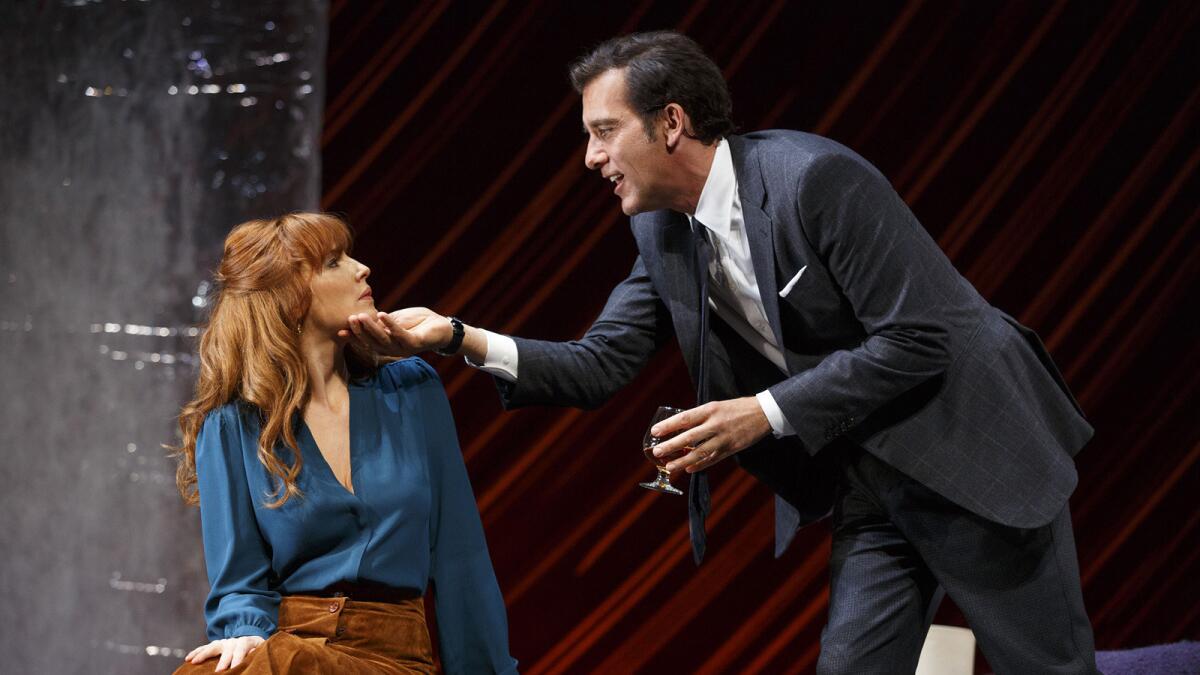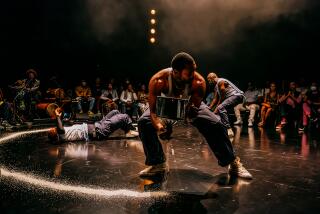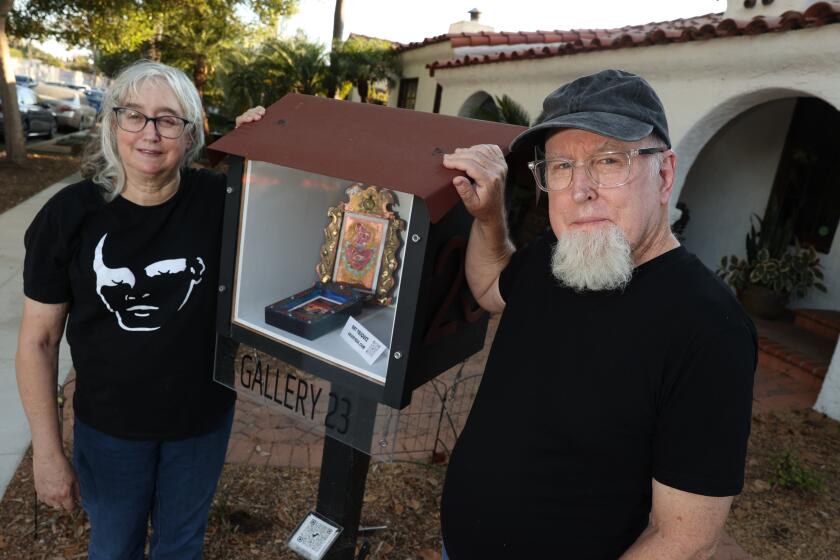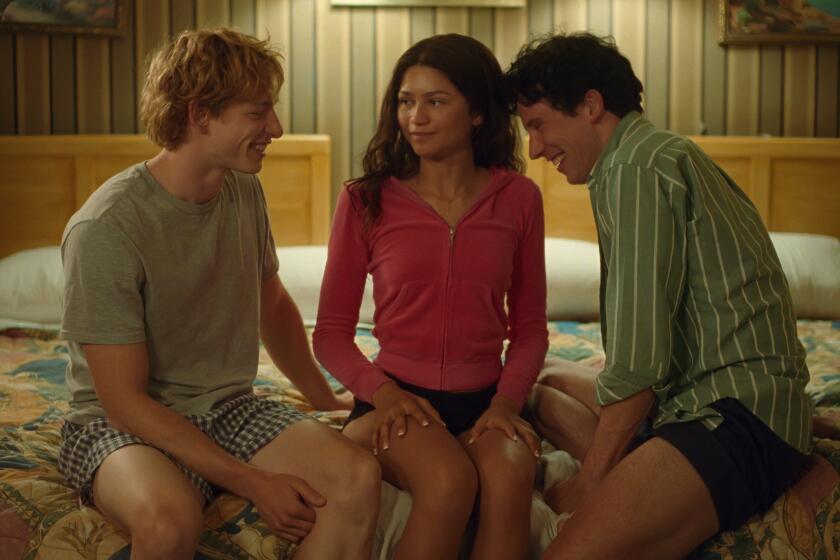Review: Clive Owen and Sam Rockwell hit Broadway in ‘Old Times’ and ‘Fool for Love’ with different results

Kelly Reilly, left, and Clive Owen appear during a performance of Harold Pinter’s “Old Times.” (Joan Marcus/Polk & Co. via AP)
Funny the way success renders yesterday’s avant-garde palatable to today’s mainstream.
Harold Pinter and Sam Shepard, once bewildering to theatergoers addicted to stories with a beginning, middle and end, now have become part of Broadway’s luxury-gift basket.
At Roundabout Theatre Company’s American Airlines Theatre, Pinter’s enigmatic 1971 three-character play “Old Times” has been dusted off as a vehicle for Clive Owen to make his Broadway debut alongside two other British actors, the luminous stage star Eve Best and Kelly Reilly, who’s having quite a good showing in her first Broadway outing.
SIGN UP for the free Essential Arts & Culture newsletter >>
At Manhattan Theatre Club’s Samuel J. Friedman Theatre, “Fool for Love,” Sam Shepard’s rambunctiously weird country-and-western ballad from 1983, has been revived with the electric duo of Nina Arianda and Sam Rockwell playing a pair of lovers whose shared DNA makes their destructive passion all the most disturbing.
Both plays take a baleful look at love, treating it as a kind of existential malady. For Pinter, the love object is always the unknowable other, a territory to be anxiously claimed but never conquered. For Shepard, love is a repetition of the past, the family drama reenacted against our will as we ricochet between the desire to be connected and the need to be autonomously alone.
Although Pinter’s work has been produced in recent years on the Great White Way with big-name stars (Daniel Craig in “Betrayal,” Patrick Stewart and Ian McKellen in “No Man’s Land”), there’s something disorienting about seeing “Old Times” on Broadway. The work, running a mere 65 minutes, lacks the elaborate relationship arc of ‘“Betrayal” and the virtuoso showmanship opportunities of “No Man’s Land.”
Directed by Douglas Hodge, who has deep experience acting in Pinter’s plays, the production uses a psychedelic backdrop, clothing that appears to have been borrowed from “The Sonny & Cher Comedy Hour” and furniture that might have seemed futuristic 40 years ago. Christine Jones’ modern antique set lends the proceedings the stale air of a vintage theatrical exercise.
The play unfolds as a kind of modernist version of Sartre’s “No Exit,” in which hell remains other people. A married couple prepare for a visit from the wife’s former roommate from long ago. Realism being beside the point in Pinter, all three characters are dimly discerned on stage from the start. Once this triangle starts conversing, Deeley, the anxious and aggressive husband, competes with Anna, the mysterious interloper, for a privileged place in his wife, Kate’s, affections.
Owen brings a tantalizing mix of masculine swagger and insecurity to his portrayal of Deeley, a character who seems to have some involvement in the film business. (Pinter was adamantly opposed to revealing the résumés of his characters.) Deeley’s cockiness is somewhat transparent. A working-class accent slips out from time to time, undermining his sang-froid but injecting a note of menace.
As Kate, Reilly lounges in the living room with the indifferent stillness of a well-manicured sphinx. Her willingness to be the canvas upon which others project their fantasies is the most convincing element of the production.
Best, styled with an awkward glamour (Constance Hoffman did the costumes), has trouble making Anna seem real. (A British expat living in Sicily, Anna appears to have stepped off the Concorde after partying all night at Regine’s nightclub.) Best, who was nominated for a Tony for her performance as Ruth in Pinter’s “The Homecoming,” seems out of sync with her fellow cast members, who have been directed by Hodge to breeze through their lines. No ponderous Pinter pauses for this crew.
As Deeley and Anna trade stories about Kate, the tension escalates between them. The past is manipulated to gain leverage in the present. Snatches of old songs become part of a game of one-upmanship. Anecdotes take on an accusatory tone. (“Yes, I remember you quite clearly ...,” Deeley says in a last-ditch attempt to ambush Anna with incriminating knowledge.) Objectivity collapses under subjectivity’s insistence.
Unfortunately, the subtextual wrangling gets lost on the big stage. “Old Times” needs a more intimate house. The language too often floats free of the characters here. Pinter’s dazzling non sequiturs don’t seem psychologically rooted. Indeed, they could be interchangeable, like the cigarettes that are relentlessly smoked.
Owen is mesmerizing for about two-thirds of the play, but as Deeley begins to crack emotionally, his performance loses credibility. The character’s final breakdown is contrived. Best’s Anna, not so much a mystery as an acting blank, gives nothing away. Reilly’s Kate wins the day by exploiting the power of silence.
The production deracinates Pinter. The playwright, who won the Nobel Prize in Literature a few years before his death in 2008, has long been part of the establishment. But his work emanated from an alternative tradition, and transplanting the delicate weirdness of “Old Times” to Broadway seems absurdist in all the wrong ways.
“Fool for Love” fares much better, partly because the play represents Shepard in a less wildly experimental mode and partly because there’s so much more emotional combustion.
Daniel Aukin’s production, which was seen last year at the Williamstown Theatre Festival, is also sensationally acted. After I saw Arianda’s Tony-winning turn in “Venus in Fur,” I vowed to myself that I would try to catch her onstage at every opportunity. She’s one of the leading actresses of her generation.
Arianda vividly embodies the conflict between May’s sensuality and shame as she bounces from the bed to the bathroom to the door of the shabby motel room, which in scenic designer Dane Laffrey’s rendering looks like a cross between a trailer home and a prison cell. (The way she wields her long blond hair, which covers her face when she’s disgusted and furiously flies in all directions when her violent temper has been stoked, is something to see.) But the revelation for me was Rockwell, who sheds new light on Eddie, the rodeo stunt man who comes barreling back into May’s life despite the impossibility of their love.
Eddie is often portrayed as a Marlboro Man, a last holdout of the iconic West. Rockwell shows that he can lasso furniture as adroitly as any carnival cowboy, but there’s a charming clumsiness to his characterization. He’s fleshy and clownish — qualities that intensify the violent threat.
When May tells him that she’s expecting a male visitor, Eddie returns with a shotgun, which he cleans with a masturbatory fervor. He’s an adolescent in an aging man’s body. When Martin (Tom Pelphrey), May’s date, tackles him, he stays tackled. Rockwell’s performance never lets us forget that “Fool for Love” is a dark and twisted comedy.
The nonrealistic elements of the production are a tad too italicized here. It’s easy enough to accept that the Old Man (Gordon Joseph Weiss) sitting in a corner of the room is a psychological figment so real and powerful it has been granted literal life.
There’s no need for the voices to be amplified and the lighting to turn shadowy to indicate the surreal. Broadway audiences, disproportionately representing the upper income brackets, are educated enough to handle the switch into a realm that decades ago represented a stylistic opposition to the commercial theater. (Today there are new revolutionary strategies being deployed.)
Pinter and Shepard have earned their day in the sun. Whether they are shown to best advantage depends on how well actors and directors meet their particular challenges. The judiciousness of producers in deciding which of these modern classics to present and where also can’t be underestimated. Budgets and ticket prices keep rising, but artistic judgment is something money can’t buy.
MORE:
More to Read
The biggest entertainment stories
Get our big stories about Hollywood, film, television, music, arts, culture and more right in your inbox as soon as they publish.
You may occasionally receive promotional content from the Los Angeles Times.











